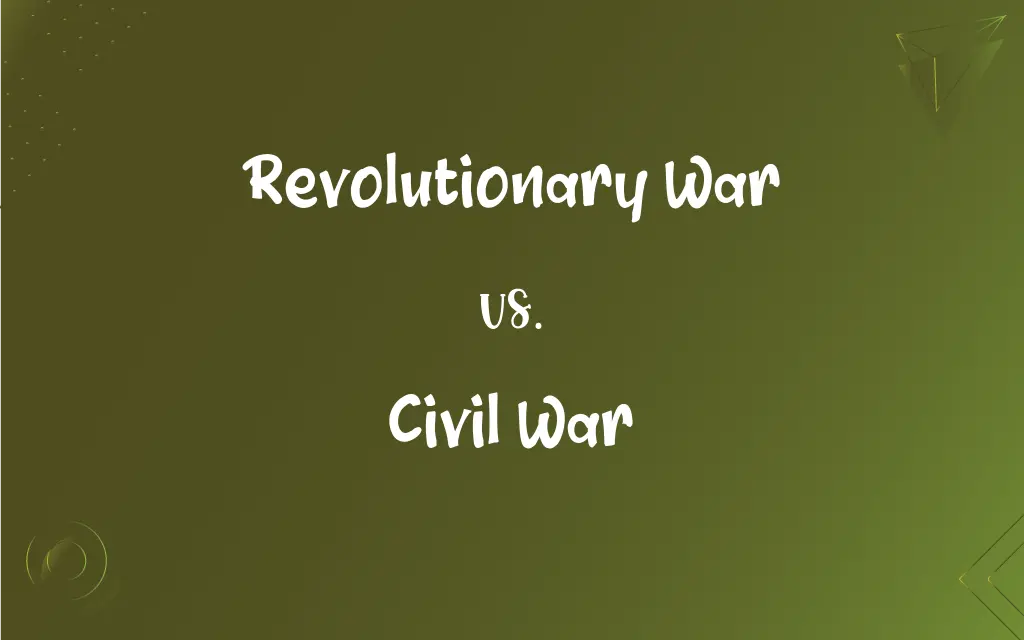Revolutionary War vs. Civil War: What's the Difference?
Edited by Aimie Carlson || By Janet White || Published on January 29, 2024
A Revolutionary War is fought for independence from a ruling power; a Civil War is a conflict within a country between opposing factions.

Key Differences
Revolutionary Wars are typically conflicts where a group in a country seeks to overthrow foreign rule or a colonial power to gain independence. The American Revolutionary War, for instance, was fought to gain independence from British rule. In contrast, Civil Wars occur within a single country, involving factions or regions fighting against each other, as seen in the American Civil War, which was primarily over states' rights and slavery.
The motivation for a Revolutionary War often includes a desire for self-governance, national identity, and freedom from external control. For example, the French Revolution was driven by the desire for democratic reforms. Civil Wars, however, are usually rooted in deep-seated internal disputes, like ideological differences or power struggles, such as the Spanish Civil War.
Revolutionary Wars can lead to the creation of a new nation, as was the case with the United States post the Revolutionary War. Civil Wars often result in significant changes in a country's political structure, but not necessarily the formation of a new nation, as seen in the reunification of the United States after the Civil War.
International involvement is common in Revolutionary Wars, either through direct intervention or support, like France's aid to American colonies. In Civil Wars, external powers may also intervene, but often more covertly or in a limited manner, to support one side over another.
The outcomes of Revolutionary Wars are usually clear-cut, resulting in independence or failure to achieve it. The outcomes of Civil Wars can be more complex, involving negotiated settlements, as in the English Civil War, or total victory by one side, as in the American Civil War.
ADVERTISEMENT
Comparison Chart
Purpose
To gain independence from a ruling or colonial power
Internal conflict within a country
Participants
Colonies or groups against foreign rulers
Factions or regions within a country
Common Causes
Colonial rule, desire for independence
Political, ideological, regional disputes
Examples
American Revolutionary War, French Revolution
American Civil War, Spanish Civil War
Outcome
Often results in a new nation
May lead to political restructuring within a country
ADVERTISEMENT
Revolutionary War and Civil War Definitions
Revolutionary War
A war often supported by external powers sympathetic to the revolutionary cause.
French assistance was crucial during the American Revolutionary War.
Civil War
A conflict often based on political, ethnic, or religious differences.
The Syrian Civil War is rooted in political and religious divisions.
Revolutionary War
A war fought to overthrow a ruling or colonial power and establish independence.
The American Revolutionary War resulted in the formation of the United States.
Civil War
A war that can result in significant changes to a nation's political system.
The English Civil War led to a temporary abolition of the monarchy.
Revolutionary War
A conflict aiming to radically change a country's political, social, or economic structures.
The Russian Revolutionary War led to the establishment of the Soviet Union.
Civil War
A war that can have long-lasting effects on a nation's society and infrastructure.
The American Civil War had lasting impacts on the United States' social fabric.
Revolutionary War
A struggle against a government perceived as tyrannical or oppressive.
The Cuban Revolutionary War was fought against the Batista regime.
Civil War
A war between different groups or regions within the same country.
The American Civil War was fought between the North and the South.
Revolutionary War
A conflict that can inspire similar movements in other countries.
The success of the American Revolutionary War inspired other colonies to seek independence.
Civil War
A conflict that often involves international intervention, though usually limited.
Foreign powers played a role in the Spanish Civil War.
FAQs
What causes a Civil War?
Deep internal conflicts within a country, often based on political, ideological, or regional differences.
What was the main issue in the American Civil War?
Primarily states' rights and slavery.
Can a Revolutionary War lead to the formation of a new nation?
Yes, such as the United States after the American Revolutionary War.
What's a well-known Civil War?
The American Civil War, fought between the Northern and Southern states.
Do Civil Wars always involve international intervention?
Not always, but foreign powers may intervene to support one side.
Do Revolutionary Wars always succeed?
No, success varies, and some fail to achieve their independence goals.
Can Civil Wars split a country into separate nations?
Rarely, they usually result in political restructuring within the same nation.
Are Revolutionary Wars always violent?
While often violent, some involve peaceful protests and political negotiations.
What's an example of a Revolutionary War?
The French Revolution, which aimed to overthrow the monarchy and establish a republic.
What defines a Revolutionary War?
A war fought to gain independence from a colonial or oppressive ruling power.
What is a common aftermath of a Civil War?
Reconstruction and reconciliation within the country.
Are Civil Wars common in modern times?
Yes, there have been numerous civil wars in the 20th and 21st centuries.
How do Civil Wars end?
They can end through military victory, negotiations, or external intervention.
How long do Revolutionary Wars typically last?
Duration varies; some last a few years, others much longer.
Can a Civil War lead to international conflict?
It can, especially if it threatens regional stability or involves major powers.
How does a Revolutionary War affect international relations?
It can change alliances and lead to new diplomatic recognitions.
What role do civilians play in a Revolutionary War?
Civilians often support revolutionary efforts and can be directly involved.
What are some long-term effects of a Civil War?
Deep societal divisions, economic disruption, and often a change in national identity.
What is the legacy of a Revolutionary War?
It often defines national identity and historical memory.
Did the Revolutionary War impact global politics?
Yes, it inspired other independence movements worldwide.
About Author
Written by
Janet WhiteJanet White has been an esteemed writer and blogger for Difference Wiki. Holding a Master's degree in Science and Medical Journalism from the prestigious Boston University, she has consistently demonstrated her expertise and passion for her field. When she's not immersed in her work, Janet relishes her time exercising, delving into a good book, and cherishing moments with friends and family.
Edited by
Aimie CarlsonAimie Carlson, holding a master's degree in English literature, is a fervent English language enthusiast. She lends her writing talents to Difference Wiki, a prominent website that specializes in comparisons, offering readers insightful analyses that both captivate and inform.































































